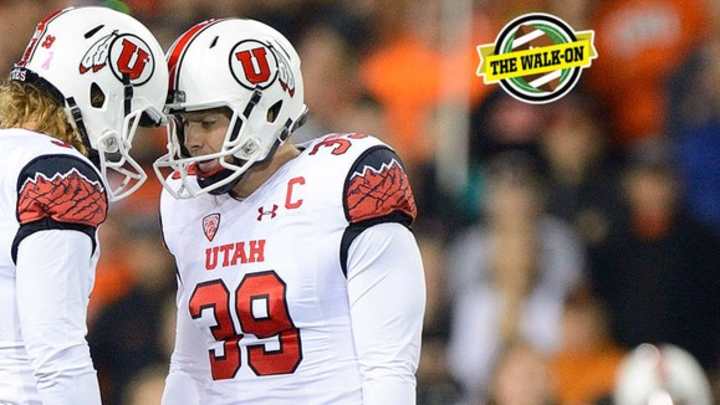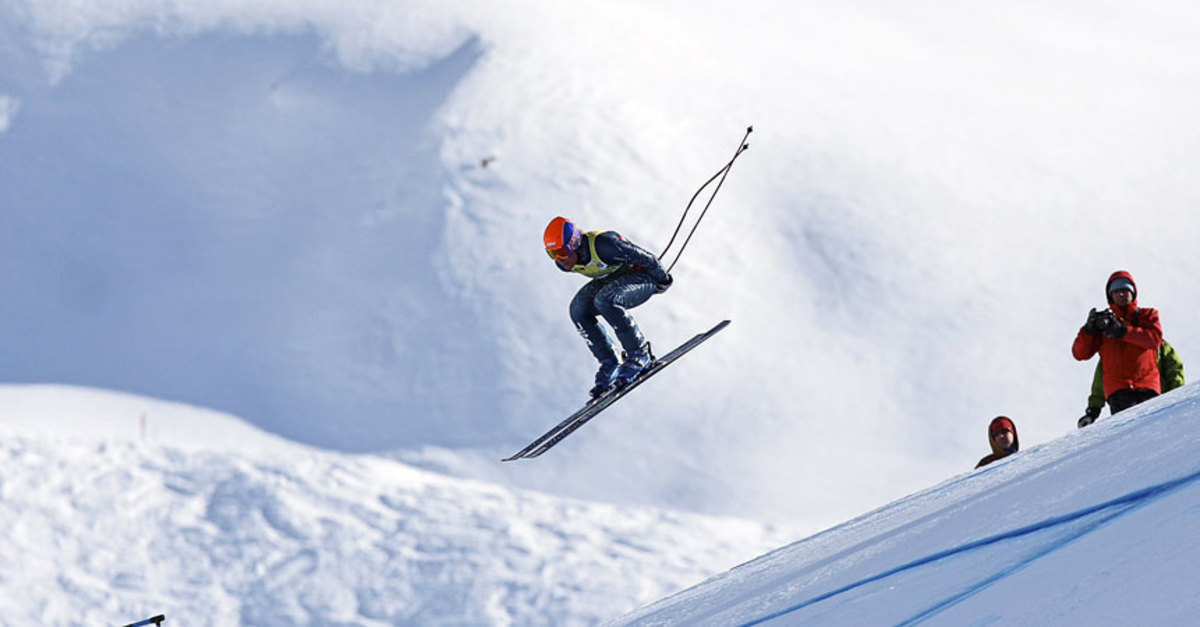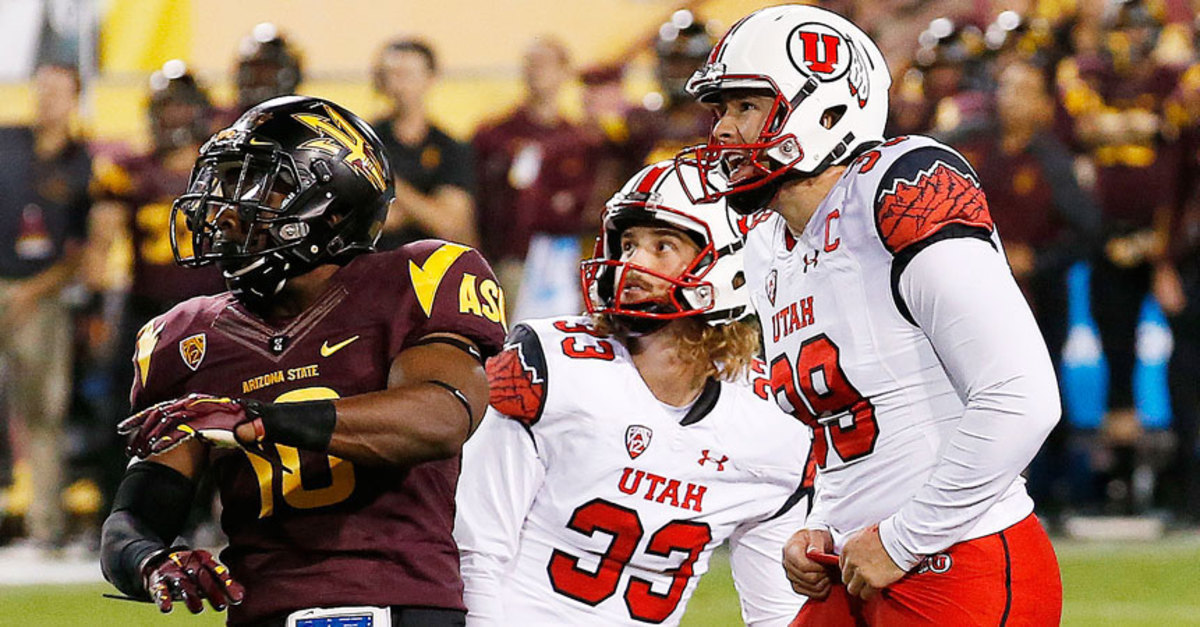Utah's unlikely duo: The unique paths of specialists Andy Phillips and Tom Hackett

Football specialists, Utah assistant Morgan Scalley likes to say, get stigmatized for being strange. Kickers and punters are known for their quirks—a unique haircut, an eccentric hobby, a superstition no one else understands. They're often the oddballs of a group, dealing with a very particular type of pressure. A quarterback is criticized for a bad game; a kicker vilified for five bad seconds.
Yet even by specialist standards, a pair of walk-ons at Utah stands out. "They're weird," Scalley says, "in a good way."
Junior kicker Andy Phillips and senior punter Tom Hackett play integral and intriguing roles for the Utes (2-0), who finish up nonconference play this Saturday at Fresno State (1-1). Their backgrounds are different, but both so unconventional that they have helped the men bond while boosting a dark-horse Pac-12 South contender.
Before joining Utah, neither had played a snap of football. Now they're two of the best players in the nation at their respective positions. "It's unique to have just one of us [on the team] who had never played football," Phillips says. "Two is crazy."
*****

Teela Photography
Phillips, 26 and married with a 1-year-old son, Max, likes to say football "fell in my lap." A longtime Utah resident—he grew up 20 miles south of Salt Lake City in Draper, Utah—Phillips dreamed of becoming a ski-racing star. He skied for the first time at 2, and attended three events (men's downhill, giant slalom and super-G) with his father at the 2002 Winter Olympics in Salt Lake City. At 16, he won the 2006 national championship in the downhill, and competed on the U.S. Ski Team from 2007-11.
His schedule didn't reflect that of a normal teenager: He woke up, worked out, attended school from 8 a.m. to noon and then headed to Park City—the site of the bobsled, skeleton, luge, and Nordic ski jumping events at the '02 games—to train until 4 p.m. Event travel kept him on the road two to five days at a time, and because snow can always be found somewhere in the world, he didn't get an off-season. He would go to Europe in January and February, return to Park City in March and April, spend June and July at Mt. Hood outside Portland, Ore., head to New Zealand (August) and Argentina/Chile (September) to catch the end of their winters and come back to the states for November and December. "Tumultuous," is how he describes that time in his life. Thrilling, too.
Phillips estimates he has broken every type of bone in his body: finger, wrist, ankle, leg and more. He has torn his meniscus, and cracked his head open when he was 10. At 14, he snapped the femur in his left leg while cliff jumping, setting his training back almost a full year. But his worst injury came in 2008 at the World Junior Championships in Formigal, Spain. During his downhill race, Phillips turned a corner and a major tailwind increased his speed from about 55 miles per hour to 75. He flew off a jump and hastily tried to adjust midair. It didn't work, and he smashed into a gate upon landing; he says in hindsight, "I was probably concussed." But slalom, his best event, was the next day and he refused to skip it. Despite a swollen and cut forehead, Phillips taped his eye open and raced. He tied for fourth, he recalls proudly.
Utah coach Kyle Whittingham calls his kicker tough and fearless, two words Phillips associates back with Whittingham. "He's gone skiing with me a few times, and it's no bunny slopes," Phillips says. "He doesn't fear a single thing. He definitely has to work on his technique, but as far as speed is concerned, he hauls some serious ass downhill."
Through all of his outdoor adventures, trying football never entered Phillips's mind. A soccer player growing up, he was forced to give up the sport his junior year of high school to focus full-time on skiing. Then, at 19, it was time for his LDS mission. Phillips headed to Norway—a fitting spot for a ski junkie—for two years. Though he was not allowed to train, he thought about his Olympic goals constantly, a dream that felt both closer and agonizingly far away as he watched the 2010 Vancouver Olympics on TV. "Watching those, it motivated me even more," Phillips says. "This was something I put so much time, so much sacrifice, into."
The last six months in Norway, Phillips received permission to work out, and rose every day to lift and run at 5 a.m. But when he returned to Salt Lake City, he sensed a shift. "My coaches weren't very happy with my decision to go on a mission," he says. "I think they saw it as me not wanting to put the time in."
In his time abroad the U.S. economy had nose-dived, and the ski team announced anyone who wished to continue training would have to pay their own way. Phillips, then 22 and married, decided it wasn't worth going $25,000 in debt for something that wasn't guaranteed. He skied that summer with the team, and walked away in the fall. Says Phillips now: "It's hard to stay motivated when a lot of people aren't believing you. So I figured I'd take that drive and use it for something else."
He thought collegiate soccer might be next, until a friend asked, "Have you ever thought about football?"
Given his soccer background, it was easy for Phillips to catch up. He redshirted in 2012 and over the next two seasons became known as "Automatic Andy" for his accuracy. An All-America and All-Pac-12 selection the last two years, Phillips has connected on 42 of 52 career field goal attempts, and 91 of 92 extra points. (He once had a streak of 78 consecutive made PATs.) He is 3 for 3 on field goals of 50-plus yards, and is a likely candidate for this season's Lou Groza Award, presented annually to the best kicker in college football.
For Phillips, the hardest part of the transition did not involve the physicality. "Kickers get such a bad rap," he says, "I'll line up against our linebackers in conditioning drills, and I can beat them."
The pressure didn't bother him either. "In skiing I'm flying downhill in a tucked position for 90 seconds at 85 miles per hour. In kicking it's five seconds of focus."
The rulebook was—and continues to be—a different hurdle. Scalley says both Phillips and Hackett occasionally, "Come up on the sideline and ask the simplest of questions and it's like, 'Holy cow, you don't know that?'"
But their naiveté can be refreshing. And sometimes, comical.
During a game against UCLA last season, Phillips boomed a kickoff, and was in position to stop the Bruins' return man before getting cold-cocked by a safety. Scalley recalls Phillips, "Stood up and looked around like, 'Wait a minute, that's not supposed to happen!'"
But Phillips points out that he has recorded four solo tackles, including one last September in which he wrapped up a Washington State returner. "All the sudden, he's right in front of me and I just threw him down. I got up and said, 'Where did that come from?'"
*****

Ross D. Franklin/AP
Like Phillips, Hackett, 23, got into football mostly by chance. A native of Melbourne, Australia, Hackett had recently finished his senior exams (similar to the SATs in the U.S., but they can only be taken once, and a low score can doom one's university future) in 2010 when he saw on the 6 p.m. news that Brendan Fevola, a local football player, was headed for the NFL. A longtime former Australian rules football player—brief summary: it involves a lot more kicking than American football—Hackett thought that path might work for him, too.
Curious, he sent an email to Nathan Chapman at ProKick Australia, an organization that trains and places Australian kids on college football rosters across America. According to ProKick's website, 15 punters have gone on to find a home at colleges in the states, and most have been given full-ride scholarships. (Hackett and Phillips were awarded scholarships in 2013 and '14, respectively.)
Hackett says he "shanked every punt" at his ProKick tryout, but Chapman told him he had obvious leg strength and could be taught proper form. Four years after learning basic technique, Hackett last season was awarded college football's Ray Guy Award, given annually to the nation's top punter. A consensus All-America and two-time first-team All-Pac-12 honoree, Hackett holds the school record for punting yards in a season (3,736 in 2014). He has booted 48 punts 50 yards or further, and going into '15 had placed 43% of his punts inside the opposing 20-yard line.
Still, he can get better. It took Hackett nearly six months to get comfortable punting a Wilson football—in Australia they practice with NFL footballs, which are wider and have a bigger "sweet spot" at which kickers can aim—and he works constantly to hone his technique. To calm his nerves during big games, he recites advice passed on from a former coach: "Just remember, there are two billion people in China who don't give a s--- if you nail this punt or not."
Three years in the states have endeared him to America, but Hackett still calls Melbourne home. He goes back once a year, typically in May, a trip that takes almost 24 hours door to door. And while he plays a sport idolized by fans across the country, he is rarely hounded for autographs. "I don't look very athletic," he says. As for Phillips's claim that kickers and punters get a bad rap for athleticism, Hackett thinks the stereotype is usually correct. "Maybe we have more athleticism than your average Joe Blow on the street, but, I mean, there's a reason I punt."
Hackett's position comes with its share of harrowing moments. Last season against USC, he corralled a long snap, looked up and gulped. "I was doing a rugby punt, so I rolled out right and suddenly someone came from my left, and my left shield didn't see him. He had to be 6' 9", 300 pounds," Hackett recalls. "The pads I wear, they're like pee wee football pads, they're very small. So I see this big bastard coming at me, I'm about to get squashed. I put on the brakes, run around him and kick."
Fortunately, Hackett has never been trucked over. His worst in-game moment, he says, came when one of his shield guys accidentally stepped on his foot.
Hackett speaks in a thick Australian accent—he says it has lessened since he got to the U.S.—and has acclimated to the chilly Utah weather. The extreme state-wide devotion to religion, well, that's another matter.
"America is such a religious country, and that's really different from a lot of other places," says Hackett, who lived in Tokyo for part of his childhood. "This was a strange culture at first. At home, I love drinking beer, or having a coffee in the morning. Well, here most beer tastes like water. I mean, I'd be a lot fatter if it wasn't that way, so that might be a good thing. My family was at the BYU game last year and my brothers went to the concession stand to get a Coke but no, they don't serve caffeine [at BYU].
"I've tried to tell my teammates beer treats you really well, it can help you out of some dark places, but they just won't listen. And, you know, no one swears. Even the word 'damn,' is frowned upon, which I disagree with."
Hackett says all of this in a playful, good-natured tone. He has enjoyed learning about his teammates' religions, peppering Phillips with questions about his beliefs. They have built a special and strange connection—and not just since Hackett acts as holder for PATs and field goals. Because of their backgrounds, they see things differently than most of their peers.
When Utah visited UCLA at the Rose Bowl last October, the two talked about the lore of playing in one of college football's most iconic venues … as it relates to soccer. "Hey," Hackett said to Phillips as they waited before kickoff. "Did you know you could potentially be sitting in the same locker that [Lionel] Messi used during the [1994] World Cup?"
Like Scalley says: Weird, in a good way.
Know of a good walk-on story in college football? Lindsay Schnell wants to hear it. Email her at SIwalkon@gmail.com.
